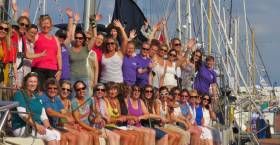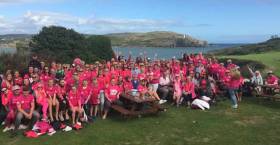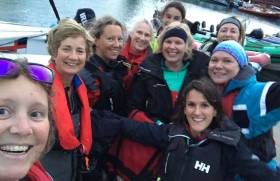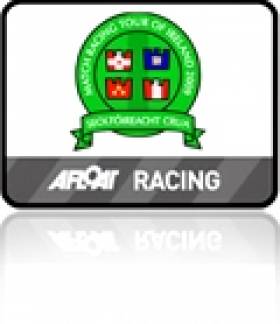Displaying items by tag: Women on the Water
All-Female Crew to Compete in Northern Ireland Inshore Points Series on Sigma 33 Elandra
Victoria Dews, the owner of Sigma 33 Elandra based in Belfast Lough, possesses many of the characteristics associated with the name Elandra, such as a strong personality, energy, charisma, and focus. She is a great advocate of Women on Water, an initiative that aims to encourage more women to participate in sailing. Victoria has put together an all-female crew comprising a diverse mix of sailors to compete in this year's Northern Ireland Inshore Points Series and local club Ladies' races on board Elandra.
Victoria recognises the need for ongoing opportunities to retain and deepen women's involvement in sailing. She hopes that by providing a platform for women to develop their sailing skills in a supportive environment, she can inspire more women to pursue their passion for sailing.
"Victoria recognises the need for ongoing opportunities to retain and deepen women's involvement in sailing"
The crew ranges from those who recently discovered the sport through initiatives like WOW-WE to seasoned sailors with years of experience.
 The Sigma 33 Elandra crew Photo: Wesley Crawford
The Sigma 33 Elandra crew Photo: Wesley Crawford
Lee Stevenson, a seasoned sailor from the Bangor clubs, Royal Ulster, and Ballyholme, will drive the boat. Fiona Hicks, a well-known sailor from Royal Ulster and Strangford Lough YC, will skipper the boat. Jennifer Bryce, a GP14 dinghy sailor from Donaghadee SC and Newtownards SC, and Rebecca Nightingale, a seasoned foredeck sailor, will also be part of the crew. Christina Cunningham, an experienced dinghy sailor and past crew in the Clipper Round the World Race, will be in charge of the main and sail trim.
Sigma 33 Elandra Crew
 Christina Cunningham
Christina Cunningham
 Sandra Halliwell
Sandra Halliwell
 Rebecca Nightingale
Rebecca Nightingale
 Fiona Hicks on the helm of an RS Elite
Fiona Hicks on the helm of an RS Elite
Elandra's first race will be on Royal Ulster's Opening Day on 27th April. The crew also plans to participate in Ladies' Races, with at least a 60/40 ratio of female to male crew. Martin, Vicki's husband, will occasionally be aboard. Victoria is excited about the potential of this venture to promote gender diversity and inclusivity in sailing and is eager to see the impact it will have.
Women on the Water Programme Sees Increase in Female Participation in Northern Ireland Sailing Clubs
The roller coaster programme that is the RYA Northern Ireland’s Women on the Water has seen a satisfyingly noticeable increase in the numbers of women sailing and taking to the water on paddleboards and windsurfers.
Recently, the Donaghadee Club on the North Down coast has seen further interest in Women's sailing after member Vicki Dews took on the task last year of getting more people back on the water after lockdown. She particularly changed the club's focus, which had been on attracting juniors, such as its successful children's Bright Night Friday sessions. “I realised we needed to concentrate on turning adults into sailing members and not just as parents of junior sailors”. Vicki said. She then thought that adult females were particularly under-represented and wondered what stopped them from trying sailing or those existing Club members who used to sail coming back into it.
 WOW-WE launch for a new adventure
WOW-WE launch for a new adventure
Having thought that some women may be more comfortable sailing in a keelboat rather than dinghies (and that does away with the need to wear a wetsuit), the normal race night on Wednesdays was re-designed to incorporate an adult female-focused component to encourage existing adult female members to have a go or come back to sailing and that is how WOW – WE came about – Women on Water Wednesday Evenings. Jimmie McKee kindly offered his Hunter 19 for the season.
The 2022 event was very successful, regularly having up to twelve participants on the water and the 2023 edition opened up to non-members. On its International Woman’s Day launch, the numbers exceeded expectations when 24 showed up.
And the interest has remained with 36 ladies, including six coordinators, in total over the four-week sessions. Of those, 16 became full sailing members, of which some have attended the adult learning course that now runs concurrently with WOW-WE.
Vickie is pleased with the result. “We’ll work out the final tally at the end of the season, analyse and plan for next year. Interestingly, after a couple of sessions on the water, the apprehension of wearing wetsuits and falling in seemed to subside, and the appeal of dinghies over small keelboats seemed to grow. However, the big keelboats were a huge appeal with several ladies offering to crew on a regular basis!
Kate Broderick, RYANI Pathways Officer, commented, “Over the course of the 2023 season, the WOW-WE has been a great success down at Donaghadee Sailing Club. It's fantastic to see more women on the water gaining confidence, developing skills, meeting new people, and getting more involved at their local clubs. We can't wait to see this programme flourish even further within the next few years."
Another club that has recently launched two successful events aimed at getting women on the water is East Down YC on Strangford Lough with Margie Crawford’s Ladies big boat cruising initiative 24 Enjoy East Down Yacht Club Ladies Cruise in Company (afloat.i and the Stand Up Paddleboarding day. Women to the Fore at East Down Yacht Club (afloat.ie)
Mind you, some clubs didn’t have to make the effort to have women sailing. Michael Clarke, Lough Erne YC Admiral, commented on social media “Back in 1895, Suffragette times, Lough Erne YC made women full members. Most sailed Colleen class boats a bit like LEYCs Yeoman class today. We began club and event J/24 racing in 1984, still going strong on Tuesday evenings. All crews include women, and one J/24 is owned by a woman. J/24 women hold elected office, including a half dozen Commodores in recent decades. Latest is our youth sailor J/24 usual crew 3 male and 3 female. Get it going and it just naturally prospers”.
 The Women in Sports networking event titled Shifting the Paradigm on Thursday 7th, September in Belfast’s Kingspan stadium
The Women in Sports networking event titled Shifting the Paradigm on Thursday 7th, September in Belfast’s Kingspan stadium
With women on the water so popular and girls and women’s football to the fore, the Women in Sports networking event titled Shifting the Paradigm on Thursday 7th, September in Belfast’s Kingspan stadium should be of interest.
Register here
DBSC Launches Tuesday Night ‘Women on the Water’ Series
Dublin Bay Sailing Club has announced the 2023 Tuesday Night AIB DBSC Women on the Water Series, a new initiative to increase female participation in sailing.
DBSC will run normal Tuesday night racing but with an added difference: boats helmed by a woman and with a minimum female compliment of 50% can enter the Women on the Water series at no additional charge.
Eligible classes are the SB20, Flying Fifteen, 1720 Sportboat, Ruffian 23 and B211 which the club hopes will deliver competitive racing with handicaps across the different classes.
There will also be series prizes for the two top performers in the series.
DBSC Commodore Ed Totterdell says: “To make this an exciting, competitive and fun racing series we would love to see as many entrants as possible so get your team together, tell your friends and sign up!”
All WOW boats will be recorded in both the standard Tuesday Series and the new WOW Series. If your boat is already entered for 2023 you can email [email protected] and ask that your entry to this series is noted.
Female Sailing To Be Promoted This Weekend At National Yacht Club
With Ireland's diverse selection of women sailors achieving an extensive range of success locally, nationally and internationally during 2022, interest in getting involved is running at a high level across the population generally, and this Friday evening (August 26th), the busy National YC in Dun Laoghaire is the focal point for an introductory weekend for the continuing Women on Water initiative, with the inaugural theme being on Choosing Your Own Route Into Sailing.
There are so many ways and experiences that can contribute to the process, yet there's no linear approach. To hear more, the initial invitation for Friday from the Women at the Helm Weekend at the NYC is for an evening in the company of five exceptional Irish female sailors to share some of the highlights of their sailing journeys so far - the hurdles they faced, the support they welcomed, and the goals they have set.
The opening symposium will welcome Joan Mulloy representing Offshore Sailing and her Vendée Globe goal, Laura Dillon sharing an insight to her Inshore Sailing experience, Diana Kissane with Team Racing, Christine Heath on Cruising Adventures, and rising star Clara Fagan sharing her experience on the Women in Sailing Menteeship with Pamela Lee. A complete programme of events afloat will then follow through the weekend.
 Foil safe? Joan Mulloy of Mayo will be one of the star speakers at Friday night's introductory symposium in the National YC
Foil safe? Joan Mulloy of Mayo will be one of the star speakers at Friday night's introductory symposium in the National YC
Women on the Water J80 crews are back in action in Dun Laoghaire from tomorrow, Tuesday 25 May, the National Yacht Club has announced.
Sailing will be on Tuesday and Thursday evenings and Saturday afternoons, in two series of one week each to prepare for DBSC racing which is planned to run until 25 September.
Interest is high so the NYC encourages anyone who wants to sail to act quickly. Sailing is organised by Women on the Water but is open to all members and new crew are always welcome.
Coaches are on board but some sailing experience is required in order to race. If you’re interested in joining up, text Caitriona O’Brien on 087 232 7748.
In other NYC news, the U25 section will also be a part of this summer’s DBSC programme, not to mention weeknight match racing in Elliot 6s.
The U25s will also be entering J80 teams in the Sovereign’s Cup in Kinsale, Volvo Dun Laoghaire Regatta, ICRA Nationals and Women at the Helm regatta — with coaching and team building opportunities for all skill levels — while the HYC will play host to an inter-club U25 J80 regatta, details to come.
Irish Sailing is seeking expression of interest from Irish sailing clubs to host the inaugural Women at the Helm Regatta next summer, as well as subsequent events in 2020 and 2021.
The debut regatta is set for two days in August for women with their own dinghies for PY sailing, as well as a keelboat competition.
More than 100 participants from age 14 up are expected to take part in the inaugural event.
“There has been tremendous interest in attending this event nationally and is set to be a fantastic celebration of women’s sailing and a great opportunity to encourage more women to take the helm,” Irish Sailing says.
Clubs with an interest in hosting the event are invited to contact Gail MacAllister at [email protected].
An Irish Sailing "Women on the Water" event was held at Baltimore Sailing Club in aid of Breakthrough Cancer Research and Marymount Hospice. There was a fantastic turnout to support these worthy charities and following registration the participants took to the water to complete a fun treasure hunt/scavenger hunt for information found at various points along the way.
Everyone then had a brief stop off at Sherkin Island to search for the last clue before returning to the sailing club for refreshments, a raffle and an auction.
The event was concluded with music in the square.
Women Take the Helm at the National Yacht Club
Gail MacAllister, Irish Sailing’s Regional Development Officer and Co-ordinator for the Women on the Water Ireland (WOWI) programme talks to Helen Cooney about how the programme is run at the National Yacht Club.
Irish Sailing launched the WOWI programme in 2011 to create opportunities for women to learn, train and compete on the water together. Since then many women across the country have been introduced to sailing through various WOWI courses and events. One person spearheading WOWI is Helen Cooney, a dedicated volunteer from the National Yacht Club.
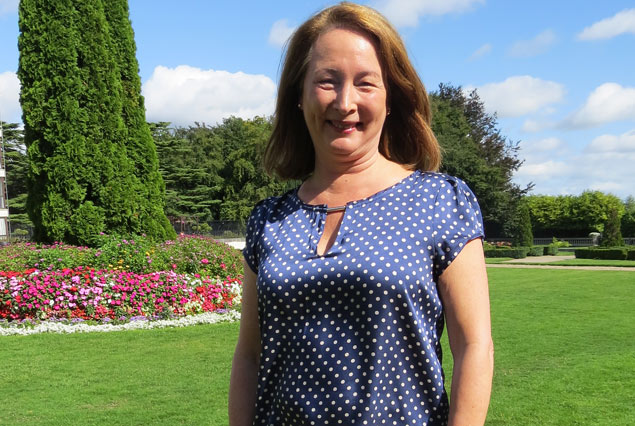 Helen Cooney of the National Yacht Club
Helen Cooney of the National Yacht Club
Helen wasn’t from a sailing family but started sailing at 14 in a Mirror dinghy in Lough Derg Yacht Club. She introduced her husband and children to sailing when they returned home from London. She knew from her own experience that this would be a great family sport. All three girls are still sailing. The youngest, Sarah, was Sailing Captain in UCD last year.
Helen was Junior Organiser (JO) in the National Yacht Club for a number of years, all while working as a physiotherapist and bringing up a young family. But even though Helen had given plenty of her time to sharing the love of sailing to children, she saw a need to encourage more women to sail, and set up her WOWI programme.
“Women sailing together as a group create great friendships and are naturally supportive of each other. Learning to sail in an all women's environment means having fun and takes the intimidation out of starting racing on a busy race course like DBSC. Many have got the bug and gone on to race in other club classes full of confidence in their abilities and what they can contribute to a new boat. We have had many beginners starting inspired by Annalise Murphy's achievements which highlight sailing as a women's sport; parents whose children sail and who want to now know more themselves; and experienced sailors returning to the sport after a break. Women feel comfortable in this inclusive atmosphere and work well as a team with everyone having a role on the boat.”
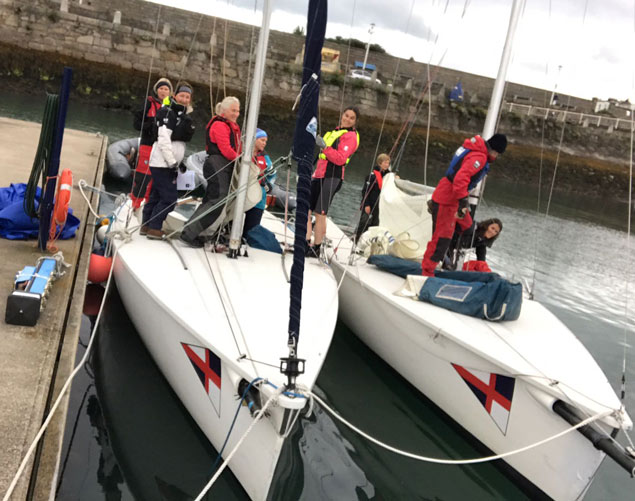 WOWI sailors prepare to go afloat on NYC 1720 sportsboats for the club's 'End of Season' race
WOWI sailors prepare to go afloat on NYC 1720 sportsboats for the club's 'End of Season' race
Helen’s team charter two 1720 keelboats from the club to use for their training and racing. There are 25 women on the programme, aged between 30 and 60. An experienced sailor in the group always helms on race night and they share the cost of a coach to help build up their sailing skills and confidence. They mainly race in the Thursday night Dublin Bay racing but have also entered teams in to the Volvo DL Regatta and Cork Week, which brought a new thrill to their achievements as a team. The programme also brings a new social world outside of the sailing with team theatre trips and club dinners or just a walk on the pier, “It is very bonding.” Helen tells us.
The WOWI programme is open to NYC members only but there is an independent crew membership rate available for 3 years to new non-boat owner members, which makes it accessible to a wider audience than the traditional buy a boat and join the club as a whole family. To support the WOWI team, the NYC also has a very successful Adult Training programme which is open to non members and members alike. This year interestingly there are now more women than men on the courses.
The club’s commitment to equality doesn’t stop on the water, the club committee currently has 4 women so there is a good gender balance and awareness of the importance of including women’s programmes.
Helen concludes “sailing is a sport that women and men can step into (or back into at any age) – it really is a sport for all. And if the sporty racing side isn’t for you, then relaxed cruising or adventure cruising is there too – solo or as a team or family. There aren’t many hobbies the whole family can participate in at an equal footing – women, children, grandparents”.
You can read more of Gail’s interview with Helen and more of her sailing colleagues in the Irish Sailing newsletter which goes out at the end of September.
Big Interest in Women's Match Racing
More than 20 ladies from around Ireland took to the water in Dun Laoghaire last weekend for a women's match racing training weekend, which may result in a ladies' Match Racing nationals taking place later in 2010.
A recent rise in interest in match racing combined with the Irish Sailing Association’s drive towards promoting women on the water resulted in full programme organised by experienced match racer Mary O’Loughlin and held in the Royal St George Yacht Club in Dun Laoghaire. Women’s match racing is a recent introduction to the Summer Olympics in 2012 and has received a strong international following in preparation for the games.
Some participants had already had a taste of match racing in the ISA’s Sail Fleet; others were fresh to the scene. Whilst some sailors were weary after a hectic week down in Cork, all were keen to try out the J80’s and get on the water.
After a comprehensive briefing on boat set up, starting procedures, tactics and rules, the ladies took to the water to put their new found knowledge into practice. Weather conditions were varied, sunshine and gentle breezes right around to a gusty force 4 on Sunday afternoon.
Under the guidance of some of Ireland’s top match racers and umpires, they completed two action packed on the water sessions and rounded it off with a closing briefing on the weekend’s racing.
The weekend was thoroughly enjoyed by all of those who took part. Many of the ladies who attended the weekend are keen to continue on in the match racing scene and plans are underway to hold a Women’s Match Racing Nationals later in the yearDun Laoghaire Women on the Water Day in July
The National Yacht Club in partnership with the ISA would like to invite women of all ages and all levels of sailing and other water sports to come sailing on Sunday 11th July from 13.00 - 17.00 hrs.
This is a great opportunity to join fellow female sailors for an enjoyable afternoon of sailing in the ISA's fleet of eight J80s, beautiful 8 metre long one-design racing sailboats. We hope to get as many women as possible out sailing on 11th July, followed by a few drinks up in the bar afterwards.
Each J80 will have 4 or 5 crew on board of whom 2 will be experienced crew who will explain all to those guests on board. Lifejackets or buoyancy aids will be supplied and are mandatory for all participants on the water.
If you are keen to join us and sail in the J80s on Sunday 11th, please contact Pamela Smithwick at [email protected] or Cathy Mac Aleavey on 0879480801.


























